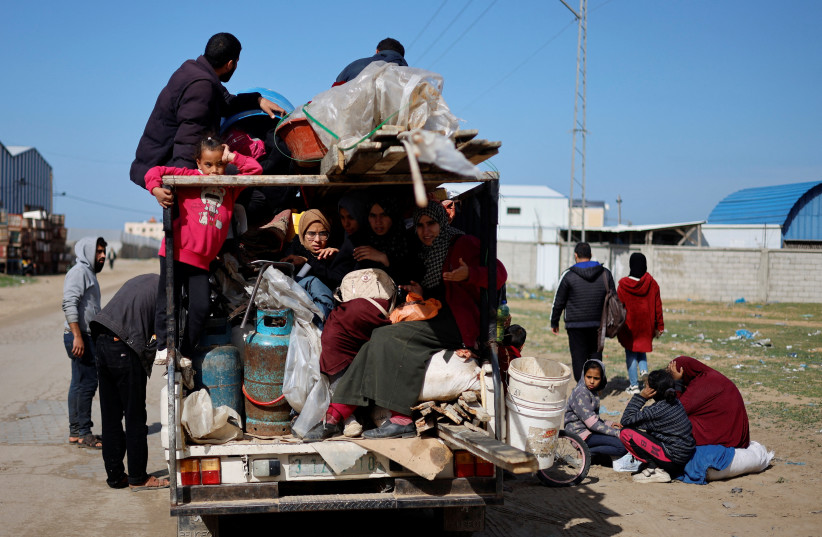The International Court of Justice in the Hague ordered Israel to halt any military operation in Rafah that destroys the Palestinian people in “whole or in part,” in a blow to Jerusalem’s diplomatic initiative and judicial system.
The court on Friday, however, did not order the IDF to completely withdraw from Gaza or to restrict its military actions in other parts of the enclave.
Hamas, the Palestinian Authority, and South Africa welcomed the ICJ order, interpreting it to mean that Israel must stop any military activity in the Rafah area of the Gaza Strip.
Israel, however, took a broad view of the ruling and explained that its operation, which it plans to continue, was about targeting Hamas and not the Palestinian people.
The ruling stated that Israel must immediately “halt its military offensive and any other action in the Rafah Governorate, which may inflict on the Palestinian group in Gaza conditions of life that would bring about its physical destruction, in whole or in part.”

It was one of four steps the 15-member judicial panel asked Israel to take in response to a petition by South Africa, which had in December asked the court to rule on its claim that the IDF’s actions in Gaza were a violation of the 1948 convention on genocide.
Already then, South Africa had asked the ICJ to intervene in the Gaza war, under a procedure called provisional measures, which allows the judges to issue orders in advance of any ruling.
The ICJ in January had rebuffed South Africa’s request that it demand an end to the Gaza war, ordering Israel instead to prevent future possible genocidal acts in Gaza and to ensure the immediate entry of humanitarian assistance into the enclave.
South Africa turned back to the court in May, asking it to update its provisional measures to the continuing humanitarian crisis in Gaza and in light of the pending IDF operation in Rafah.
Israel had insisted that its military must enter Rafah to defeat the remaining Hamas battalions in what it said was the terror group’s last remaining stronghold in the enclave.
South Africa and the international community have been concerned about the impact of such an operation on the 1.3 million Palestinians who had been in the area, many of whom had sought shelter there to escape Israeli bombing in other parts of Gaza.
Rafah evacuations weren't enough
Over 800,000 Palestinians have fled Rafah since Israel began a limited Rafah operation earlier this month.
“Israel has not sufficiently addressed and dispelled the concern raised by its military offensive in Rafah,” ICJ President Nawaf Salam said.
“The court finds that the current situation arising from Israel’s military offensive in Rafah entails a further risk of irreparable prejudice to the plausible rights claimed by South Africa,” Salam said as he read out the ICJ’s four demands.
All measures were agreed upon in a vote of 13-2. The two votes against each measure were Julia Sebutinde, Uganda’s representative to the International Court of Justice, and Aharon Barak, former Israeli High Court President and Israel’s appointee to the ICJ Panel.
The court stressed that Israel must ensure that the Rafah crossing from Egypt into Gaza remains open at a “scale of urgently needed basic services and humanitarian assistance.
Israel must also, “ensure the unimpeded access to the Gaza strip of any commission of inquiry, fact-finding mission or other investigative body mandated by competent organs of the United Nations to investigate allegations of genocide.
Israel, Salam said, must within a month submit a report to the showing its compliance with these orders.
In its argument to the court earlier this month Israel had warned that South Africa’s ties to Hamas made any of its request suspect, charged that Pretoria was exploiting the genocide convention to weaken Israel’s ability to battle Hamas.
It had also warned against the use of the genocide convention to interfere with an army’s military strategy against enemy forces.
Israel is a party to the 1948 convention and thus any ICJ ruling on the issue is binding upon it. The Jewish state and its officials have rejected all claims of genocide. Israel has argued that it is fighting an existential defensive war as it has accused Hamas of genocidal intentions against the Jewish people.
It has noted that the war began with the Hamas-led invasion against southern Israel in which over 1,200 people were killed and 252 seized as hostages, of which 125 remain in captivity.
South Africa has pointed in part, to UN reports of starvation in Gaza and Hamas’s reporting of a high fatality count, now close to 36,000, of which close to 25,000 are verified deaths. Israel has said that some 14,000 of the Gaza fatalities are combatants.
